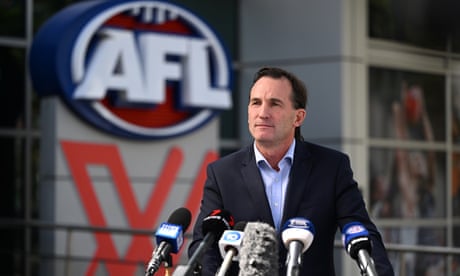
The AFL has confirmed players who test positive to internal club drug tests have been pulled from match day lists as part of its illicit drugs policy, arguing the approach is in the players’ best interests.
The league’s statement follows allegations raised in federal parliament of secret illicit drug tests conducted to enable AFL players to avoid detection on game days.
The AFL did not directly address those allegations in its response on Wednesday morning, but provided new insight into how its illicit drug policy operates.
“Urine tests conducted by doctors to determine if a player has used illicit substances are part of the AFL’s illicit drug policy medical model and have been for some time,” it stated.
“Doctors may use those urine tests to obtain an immediate result to determine whether any illicit substance remains in a player’s system. This is normally conducted at the club or in the doctors consulting rooms.
“If the test shows a substance is still in the players system, a doctor will take steps to prevent a player from taking part in either training and/or an AFL match both for their own health and welfare and because having illicit substances in your system on match day may be deemed performance enhancing and a breach of the Australian Football Anti-Doping Code (depending on the substance involved).”
The league’s policy is under review this year, and Wilkie’s comments – as well as the first ever AFLW drug-related sanction for two Sydney Swans players this week – are likely to influence its final form.
The AFL defended the principles behind the policy’s approach, saying “we are unapologetic about club and AFL doctors taking the correct steps to ensure that any player who they believe has an illicit substance in their system does not take part in any AFL match and that doctor patient confidentially is upheld and respected”.
AFL chief executive Andrew Dillon said the practice would continue.
“It’s been part of the illicit drugs policy – the clinical intervention tests – and they will continue to happen because what we’re trying to do is prioritise the health and safety of our players.”
Independent federal MP Andrew Wilkie raised the allegations in parliament on Tuesday, which he said were based on information from former Demons club doctor Zeeshan Arain.
Speaking at his weekly press conference on Wednesday, Melbourne Demons coach Simon Goodwin said it was up to the AFL to explain its approach to illicit drugs.
“This policy is an AFL policy, it’s an AFLPA [AFL Players Association] policy and it’s led through a medical model, so you’re asking me questions that I have no line of sight over and it’s something that I’ve never really thought about to be honest.”
Under the AFL’s illicit drugs policy, players can test positive once but the results are not released, under a model that is designed to help them access support outside the public glare.
“All I do is I get the information that I’m required and the policy says that it’s information that should remain confidential,” Goodwin said. “So it’s not unexpected that I don’t have the information because that’s the way the policy is designed.”
Wilkie told parliament on Tuesday Arain had said the AFL wanted players to compete at all costs.
“If there are no illegal drugs in the player’s system they are free to play, and if there are drugs in their system the player is often asked to fake an injury,” Wilkie said.
The AFL said its approach to its illicit drug policy required a balance of competing rights and interests.
“The medical interests and welfare of players is a priority for the AFL given everything we know about the risks facing young people generally and those who play our game in particular,” the league said.